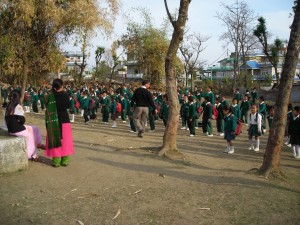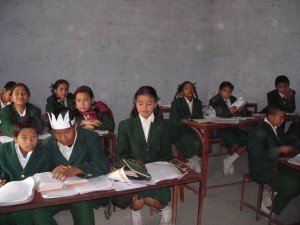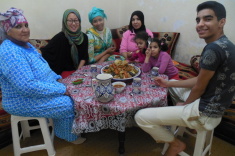

A friend of mine asked me several questions about the school and the students here, and this made me realize how truly different school in Nepal is than in the West. It’s a little difficult to explain, but I will try anyway.
For starters, school kind of feels like boot camp, as I explained with the morning assembly (the afternoon assembly being identical to that of the morning). Students are trained from the beginning to have an utmost respect for their teachers. It’s always, “Good morning Miss” or “Goof afternoon sir” when a student passes a professor. And when you walk into a class, you are greeted with another “Good morning miss, how are you?” I then respond with an, “I am fine, how are you class” and they respond, “We are fine miss”. Afterward, I tell them to sit down and they say, “Thank you miss”. At the end of class, I thank my class and tell them goodbye and they chant, “Thank you miss, you are welcome miss, thank you miss.” (which I don’t quite get, but whatever…). At first I found this strange and awkward but now I have started having fun with it. I will dance or conduct an orchestra when they are thanking me, or I will say or ask something different than what I am supposed to say. They will usually look confused and stare at me blankly, unsure of what to say, but the older students (those who actually understand what I am saying) have quickly caught on and learned to roll with it, or at least laugh!
Because of my background in philosophy and my most recent education years spent at a liberal arts school, I think I have forgotten how younger students learn. Furthermore, I have my own ideas about HOW students should learn. Because of that, I think at first I expected too much from the students. I expected them not to copy answers to questions directly from the book, but rather to understand what they read and formulate their own answers. I expected not to have to guide them every single step of the process. I expected that students would simply write down what I was saying in class if was important; that I didn’t have to write in on the board for them to copy it in their notebooks. I quickly learned, however, that if I teach this way, what I will have staring at me every day is a bunch of confused students. I still can’t remember if I was the same way when I was in elementary school or if it is just the way the students are used to being taught here. I think it’s a mixture of both. At this age (and especially because English is not their first language) students do need to be spoon-fed information a little bit. But I also know (from observing other classes and watching my own sisters study) that students here are used to a certain style of learning that is quite different from my own. They are used to having teachers speak at them. Discussion and debate are not welcome in class – the teacher is the ultimate authority. Students are not taught to think critically at all (this is rather frustrating actually). They expect quizzes and exams to cover the exact questions that they worked on in class; if they are given a question even worded differently, they get confused and cannot answer it. I listened to my sister Aartee study for her unit tests last week (yes, I listened – students here chant while reading, and it’s actually quite eerie sounding, and also annoying if they are anywhere near you) and was surprised that she was trying to memorize, word for word, answers that the teacher had given the class regarding Shakespeare and other things. She did not have the text of the stories in front of her, she was not trying to understand what Shakespeare was taking about in his plays – she was just memorizing. My students do the same and are thus unprepared (or at least not used to) my quizzes. But this is one point which I am not willing to concede with them on. I have adapted my teaching style to their needs so that I can be as effective and helpful as possible, but I am not willing to give up my belief that the students learn to think critically.
For starters, school kind of feels like boot camp, as I explained with the morning assembly (the afternoon assembly being identical to that of the morning). Students are trained from the beginning to have an utmost respect for their teachers. It’s always, “Good morning Miss” or “Goof afternoon sir” when a student passes a professor. And when you walk into a class, you are greeted with another “Good morning miss, how are you?” I then respond with an, “I am fine, how are you class” and they respond, “We are fine miss”. Afterward, I tell them to sit down and they say, “Thank you miss”. At the end of class, I thank my class and tell them goodbye and they chant, “Thank you miss, you are welcome miss, thank you miss.” (which I don’t quite get, but whatever…). At first I found this strange and awkward but now I have started having fun with it. I will dance or conduct an orchestra when they are thanking me, or I will say or ask something different than what I am supposed to say. They will usually look confused and stare at me blankly, unsure of what to say, but the older students (those who actually understand what I am saying) have quickly caught on and learned to roll with it, or at least laugh!
Because of my background in philosophy and my most recent education years spent at a liberal arts school, I think I have forgotten how younger students learn. Furthermore, I have my own ideas about HOW students should learn. Because of that, I think at first I expected too much from the students. I expected them not to copy answers to questions directly from the book, but rather to understand what they read and formulate their own answers. I expected not to have to guide them every single step of the process. I expected that students would simply write down what I was saying in class if was important; that I didn’t have to write in on the board for them to copy it in their notebooks. I quickly learned, however, that if I teach this way, what I will have staring at me every day is a bunch of confused students. I still can’t remember if I was the same way when I was in elementary school or if it is just the way the students are used to being taught here. I think it’s a mixture of both. At this age (and especially because English is not their first language) students do need to be spoon-fed information a little bit. But I also know (from observing other classes and watching my own sisters study) that students here are used to a certain style of learning that is quite different from my own. They are used to having teachers speak at them. Discussion and debate are not welcome in class – the teacher is the ultimate authority. Students are not taught to think critically at all (this is rather frustrating actually). They expect quizzes and exams to cover the exact questions that they worked on in class; if they are given a question even worded differently, they get confused and cannot answer it. I listened to my sister Aartee study for her unit tests last week (yes, I listened – students here chant while reading, and it’s actually quite eerie sounding, and also annoying if they are anywhere near you) and was surprised that she was trying to memorize, word for word, answers that the teacher had given the class regarding Shakespeare and other things. She did not have the text of the stories in front of her, she was not trying to understand what Shakespeare was taking about in his plays – she was just memorizing. My students do the same and are thus unprepared (or at least not used to) my quizzes. But this is one point which I am not willing to concede with them on. I have adapted my teaching style to their needs so that I can be as effective and helpful as possible, but I am not willing to give up my belief that the students learn to think critically.


